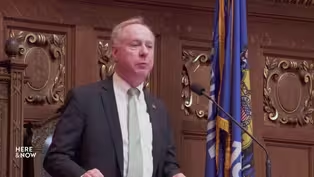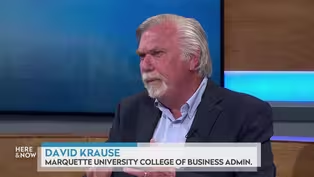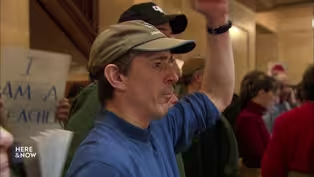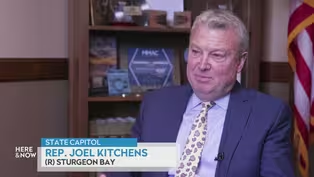Here and Now
Ryan Rasmussen on New I.D. Requirements for Food Pantries
Clip: Season 2200 Episode 2246 | 5m 21sVideo has Closed Captions
Ryan Rasmussen on new identification rules to access food pantries receiving federal aid.
Oshkosh Area Community Pantry Executive Director Ryan Rasmussen explains new identification rules for people seeking food from pantries receiving federal aid, and why that change is largely positive.
Problems playing video? | Closed Captioning Feedback
Problems playing video? | Closed Captioning Feedback
Here and Now is a local public television program presented by PBS Wisconsin
Here and Now
Ryan Rasmussen on New I.D. Requirements for Food Pantries
Clip: Season 2200 Episode 2246 | 5m 21sVideo has Closed Captions
Oshkosh Area Community Pantry Executive Director Ryan Rasmussen explains new identification rules for people seeking food from pantries receiving federal aid, and why that change is largely positive.
Problems playing video? | Closed Captioning Feedback
How to Watch Here and Now
Here and Now is available to stream on pbs.org and the free PBS App, available on iPhone, Apple TV, Android TV, Android smartphones, Amazon Fire TV, Amazon Fire Tablet, Roku, Samsung Smart TV, and Vizio.
Providing Support for PBS.org
Learn Moreabout PBS online sponsorshipto decertify Wisconsin's 2020 election results.
Starting in October, 265 emergency pantries in Wisconsin that accept donations from the Federal Emergency Food Assistance Program can no longer ask visitors to verify their address in order to access free food.
This new state rule comes as food pantries are seeing an explosion in need, and such verification can be a barrier to access.
But could it also result in shortages at popular locations like the Oshkosh Area Community Pantry that saw a 70% increase in usage last year?
We ask its executive director, Ryan Rasmussen, and thanks very much for being here.
Pleasure to be here.
>> So, as we've said, your pantry has seen a major surge in demand in the last few years.
How related is that surge to the end of extra food share benefits available during the Covid pandemic?
>> Absolutely.
Extremely last year around the March time frame, right when food share benefits were starting to go back to pre-pandemic levels and at the exact same time that that was happening, we were also seeing inflation at the highest we've seen in a long time.
Food prices were skyrocketing, groceries and gas, everything was just through the roof.
So all of it culminated in a really perfect storm of a lot of expensive things and folks needing some additional help.
>> So your location also operates more like a regular grocery store where people can choose the food they need or want.
How much does that influence its popularity?
Do you think?
>> I think we're extremely popular because of that.
We are firm believers in in the dignity and respect of all of our guests.
And so we truly believe that there's power in choice.
And so we believe through that choice, folks retain their dignity.
And so rather than getting a pre-loaded box of food, folks are able to come shop our aisles just like they would any other grocery store.
Really providing a dignified shopping experience as opposed to a pre-loaded box of food.
And so for us, we're extremely popular because of that model, because folks are able to shop like us, shop, shop with us like anybody else.
>> So in fact, you see hundreds of people from outside your county visiting your pantry.
Can can you keep up with that demand ?
be interesting, especially as we talk about the new Tefap regulations that are coming in.
I certainly agree that, you know, creating a barrier free opportunity for guests is super important, and we value that.
And we believe that also.
But I think there's some logistical concerns that we really need to think through in order to make this happen.
And obviously ensuring that, you know, there's plenty of food to go around all the pantries that need it is one of them.
And I think one of the things we'll have to look at is how can we redistribute that food in a food system where food is available, you can get it, but how can we allocate it?
The right way to the pantries that need it, that are seeing some major increases?
>> So that's what you mean when you talk about the logistical challenges, potentially like moving it from out of your county into another.
>> Yeah, exactly.
And some of the other pieces that we have to think about too is with these regulations, you know, without being able to verify proof of address for pantries that have service areas like we do at and I assume a lot of other pantries th roughout the state, there's really a couple of ways that we 're thinking about having to, to distribute this product.
We 'll either have to separate the inventory or we're going to have to reduce and eliminate the service areas.
And so with that comes a lot of logistical pieces, especially in our store to model that we have where, you know, being set up like a grocery store, having multiple programs in that store could create some additional confusion for our guests, because how much of the food in your pantry comes from the Federal Emergency Food Assistance Program?
Yeah, right now it's about anywhere from 15 to 20% of the overall food that we get.
And so although that percentage doesn't seem really high, the actual quantity and the quality of the food that we're getting is fantastic, we're taking advantage of a milk program where we're able to get, direct to farmer to pantry milk, for free, a lot of produce comes from, from the Tefap program, as well as some of the high protein rich foods that we look for in canned goods.
So although the overall quantity isn't huge, the quality of it is really good.
So it's something we wouldn't want to sacrifice.
>> Losing how has the clientele of your pantry changed over the past several years?
>> Yeah, we certainly have seen, and a lot of pantries experience this.
The age demographic for pantry users is generally skews a little older, and we've seen that age demographic come down quite significantly for us, especially as we were talking about when food share benefits were rolled back, you know, we were seeing a lot of middle income folks who generally were on the bubble before where they made too much to qualify for services, but but not enough to make ends meet are the ones that are really now the ones that are being affected by what's happening.
And so all that does is we're seeing a lot more families.
We're seeing a lot more children, we're seeing a lot more of that younger demographic of folks that are coming in who are needing the extra help.
9,000 Signatures Submitted in Another Effort to Recall Vos
Video has Closed Captions
Clip: S2200 Ep2246 | 25s | Signatures were submitted in a second attempt to recall Assembly Speaker Robin Vos. (25s)
Could drought strand mussels again?
Video has Closed Captions
Clip: S2200 Ep2246 | 6m 11s | Drought caused thousands of mussel strandings in 2023, could it happen again a year later? (6m 11s)
David Krause on WRS Investing Millions into a Bitcoin ETF
Video has Closed Captions
Clip: S2200 Ep2246 | 5m 27s | David Krause on the Wisconsin pension system's $100 million purchase into a Bitcoin ETF. (5m 27s)
Here & Now opening for May 31, 2024
Video has Closed Captions
Clip: S2200 Ep2246 | 1m 21s | The introduction to the May 31, 2024 episode of Here & Now. (1m 21s)
Oral Arguments Over Act 10 Lawsuit in Dane County Court
Video has Closed Captions
Clip: S2200 Ep2246 | 1m 24s | Lawsuit challenging Act 10 heard oral arguments from those representing public employees. (1m 24s)
Rep. Joel Kitchens on Bill Requiring Phonics Reading Method
Video has Closed Captions
Clip: S2200 Ep2246 | 6m 5s | Joel Kitchens on a bill that requires the "phonics" method to teach children how to read. (6m 5s)
Providing Support for PBS.org
Learn Moreabout PBS online sponsorship
- News and Public Affairs

Top journalists deliver compelling original analysis of the hour's headlines.

- News and Public Affairs

FRONTLINE is investigative journalism that questions, explains and changes our world.












Support for PBS provided by:
Here and Now is a local public television program presented by PBS Wisconsin





